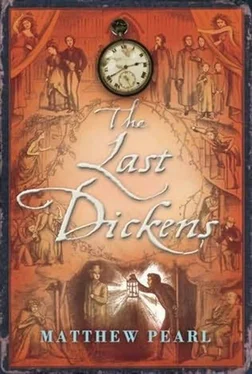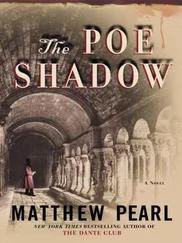“But we wish to sell our editions of his work already printed, my lad,” Fields objected. “That is where the money is.”
Osgood smiled broadly. “Mr. Fields, I believe Daniel has a good notion. We can sell both. New special editions, in paper covers, will be unique. Memorabilia for those who attend the readings, and inexpensive gifts to their family and friends who could not get tickets to see Dickens. While the standard editions will still be sold for personal library collections. Excellent idea, Daniel.”
Rebecca, who was bringing a box of cigars for them to the Authors’ Room, had paused at the door and glowed at Osgood's praise for her brother.
ON THE WAY OUT of the office building on that day, pleased at the resolution, Dolby purchased several papers from a newsboy. “That Osgood is a genial man, Branagan, though with an almost grim smile,” he was saying. “Don't you notice? He smiles as if he does not believe anything he beholds. Oh, God! That I were but dead!” Dolby exclaimed upon opening one of the papers.
The article called “Dickensiana” described a floral offering left for Dickens at his second Boston reading by a young woman. Dickens does not live with his wife, it is said. This fact adds spice to this little story. The nice parties he gives are usually to several people largely of the female persuasion, all of whom were captivated by the Bozzian soup and sentences. Oh, Charles, at your age and with that bald head and that gray goatee!
In a different paper, a cartoon showed a haughty Dickens on the streets of Boston with a young boy running up to him. The boy held a large letter H -the letter dropped from most words by the cockney accent-and was shouting, “Hello mister, look-a-here, you've dropped suthin’.” It was not the first paper to mock his modest cockney origins.
“‘At your age,’ dear heavens! That would put him in a red hot fury for three days. On penalty of your life, don't let the Chief see them, Branagan!” Dolby stopped the next newsboy he could find and bought up every copy of the papers in his possession.
AFTER A SERIES of successful readings in Boston, the entire party took a nine-hour express train to New York, where it had been snowing heavily. Within a few days of their arrival, eighteen inches covered the ground, walls of white lining the sides of the streets. Dolby hired a sleigh for the Dickens party to use since the carriages could no longer get around. Dickens, whenever he left the Westminster Hotel, would resemble some kind of Old World emperor as he was pulled on the red sleigh, his lap piled high with buffalo robes to keep out the cold.
The New York World , in an article about how Dickens desired privacy, included his room number at the hotel. The article also noted rather disapprovingly Dickens did not use the mustard on the table once during his first dinner there. The Herald suggested that the scum of New York surround this visiting Homer of the slums and back alleys so that he could not slip out unnoticed as he had tried to do in Boston.
Tom arrived at the hotel with some of the late baggage and found Dickens and Dolby comforting an old woman who was sobbing tears of humiliation. The hotel detective stood over them.
Tom joined Richard Kelly, their ticket agent. “What happened?” Tom whispered.
Kelly explained that she was a widow who was very dear to the hotel landlord and had brought flowers to Dickens's room. As she was exiting Dickens's room, another woman appeared in the hall and started pummeling the widow with her fists. By the time the victim's shouts brought Dickens and a hotel waiter running, the other woman was gone.
“Imagine a poor little white-haired widow-one of the Majesty's admirers-attacked!”
“Why would that other woman have done that?”
“Because she was a little off her head!” concluded Kelly.
Tom, preoccupied with what had happened, left Kelly's side and went back to the hall.
“I don't know,” he could hear the crying widow saying. “She said I had awful daring to go into the rooms of Charles Dickens without escort like I was your wife. She just kept hitting me, first with her carpetbag and then her fists. Oh, Mr. Dickens!”
Dickens replied, “I am sorry for this. Queer it is that I should be perpetually having things happen that nobody else in the world would be made to believe.”
FOR THE NEXT SERIES of sales, Dolby had a plan to combat the speculators. Each ticket would be stamped with a unique number before it was sold, defeating reported counterfeiting attempts. With ten thousand tickets for the next New York sale, and then eight thousand for Baltimore and six thousand for Washington, this required many days’ work for Tom, Richard, and Marshall Wild, an unassuming American ticket agent hired to help them. The labor of the stamping kept waking Dickens, so Dolby moved the group into the hallway where they had to sit on the floor. Next, Dolby instructed his staff that the first fifty men on line for the tickets-who were always mostly speculators or their agents-should be sold tickets only for the back rows of the theater so that the speculators could not grab the best seats.
The papers, of course, printed reports of Dolby bullying the innocent New York citizens in his search for speculators and gleefully remarked that no “ Dolby ex machina ” would solve the problem. “Surely it is time that the Pudding-Headed Dolby”-preached the World - “retired into the native gloom from which he has emerged!”
This time the sale was to be held in Brooklyn and on a bitter day, colder than any they experienced in Boston. At eight o'clock in the morning, their sleigh arrived after being conveyed by ferry across the river. Dolby stepped down to the street with his case of tickets, followed by Tom, Kelly, and Wild.
“Good Lord,” Dolby swore to himself in a low whisper looking over the spectacle.
The line was three quarters of a mile long. Later it would be reported by the newspapers, in the aftermath of the incident about to transpire, as three thousand people. They had chosen the Plymouth Church for the reading as the only building suitable for the expected size of the audience. The pulpit had to be taken down to make room for the gas lighting and the screen.
The ticket staff was hassled by the crowd as they went.
“We'll buy you right up, Dolby, sleigh and all!”
“So Charley has let you have the sleigh, has he, Dolby? How's he feeling this morning? Writing a new book for us?”
“Let me carry the ticket portmanteau for you, Pudding-Head! Tell Dickens to take my wife back with him to the mother island if he don't want his no more!”
There were policemen and detectives already present trying to hold back the crowd. One of the police officers made his way to Dolby and whispered to him. Dolby nodded and headed to the ticket office to prepare for the onslaught.
During the night the Réaumur thermometer had dropped below zero. The men who had lined up stretched out on straw mattresses, drank cheap whisky, sang rowdy songs, built fires. Pocket pistols had been displayed to ward off latecomers hoping to steal spots.
The policemen had identified a large number of known speculators not only from New York but from Philadelphia, New Haven, and Jersey City as well. The speculators’ aides toasted to Dickens's health with bourbon whiskey and ate bread and meat they had been supplied in little bags by their employers. Included in the group was the speculator seen before, old in appearance yet quite energetic, in the outfit of George Washington. He was babbling about how Charles Dickens's visit was the most important affair in all American history. Coming from George Washington, this seemed rare praise.
“For we won't go home till morning, till daylight does appear!” The song started somewhere in the middle of the line and spread through the motley crowd. One fellow proposed a toast to the two men who had put their stamps on the civilization of the nineteenth century, “William Dickens and Charles Shakespeare. Let anyone deny it who dares!” he boomed.
Читать дальше












